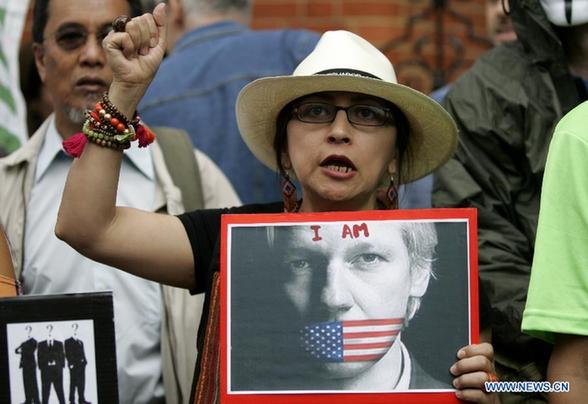Ecuador says it is granting asylum to WikiLeaks website founder Julian Assange, who has sought refuge in the country's embassy in London. Speaking at a press conference in Quito, Foreign Minister Ricardo Patino says the Ecuadorian government would keep loyal to its tradition to protect those who seek refuge with them at their diplomatic missions. Ricardo Patino, Ecuadorian Foreign Minister, said, "The Ecuadorian government, after carrying out a fair evaluation of the situation, explained to us by Mr Assange and listening to his own arguments, shares the fears of the solicitant and assumes there is evidence which allows us to presume that he could face political persecution if the appropriate measures are not taken."  | Supporters of Wikileaks founder Julian Assange demonstrate in front of the Ecuadorian Embassy in London, Britain, Aug. 16, 2012. |
Patino said the decision was made after Britain, Sweden and the US refused to guarantee that Assange would not be extradited to the US for trial over his release of classified US documents. Patino said Ecuador was worried that if Assange was extradited to the US, he would not receive a fair trial. He added that it was a "sovereign decision" protected by international law. Britain's Foreign Office says it is disappointed by Ecuador's decision, but that it still plans to fulfil its legal obligation to extradite Assange to Sweden, where he faces sexual assault allegations. Assange remains in the Ecuador's embassy, where he has been staying since June 19th. Britain has pledged to arrest him if he leaves. The 41-year-old Australian who founded the Wikileaks website has embarrassed several governments, including the US, by publishing millions of secret diplomatic cables on the Internet.
|